5. Iron Eagle
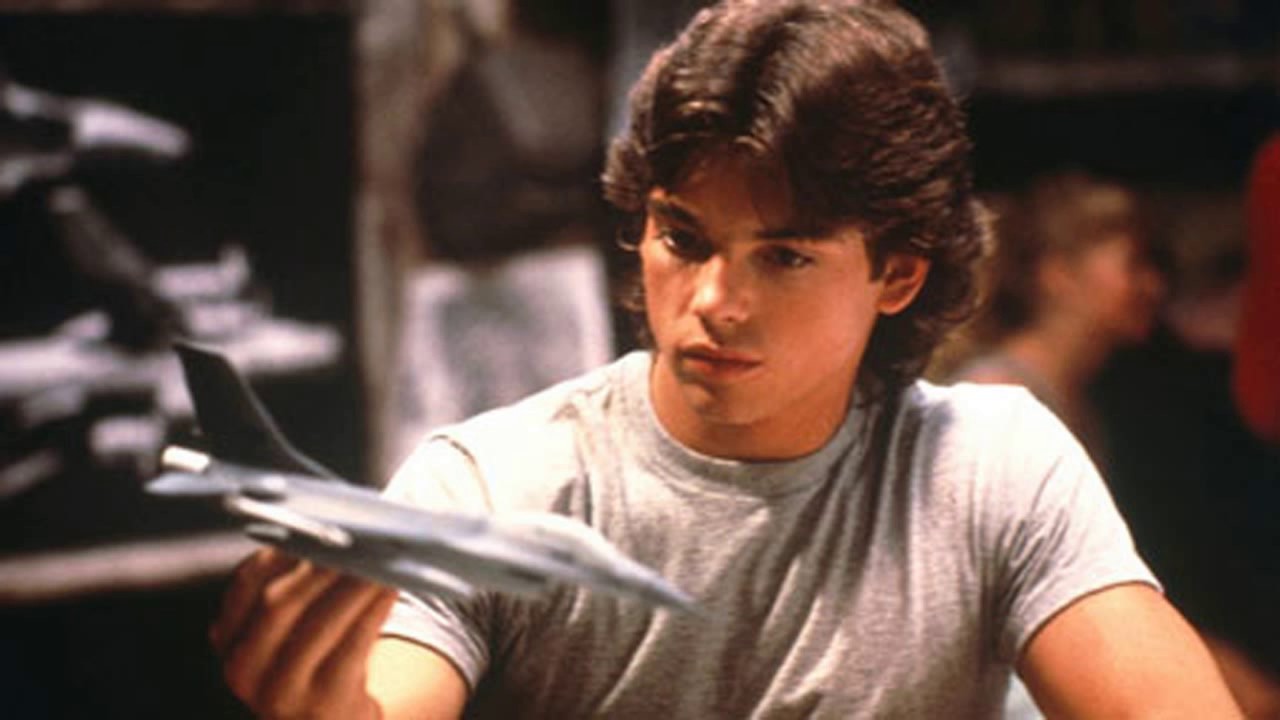
It almost seems unfair to have such a fun, ridiculous and corny 80’s film on his list, which hardly seems to take itself seriously. This is a mixed bag because the bubblegum pops when the aerial combat scenes start. Then suddenly the film turns from a teenage high school film into a full force aerial military war movie, while still switching fluently to a tongue-in-cheek vibe, mainly due to the great acting of Louis Gossett Jr. who plays Col. Charles “Chappy” Sinclair.
The protagonist is an 18-year-old teenager named Doug Masters whose fighter pilot father has been taken hostage by an unnamed Middle Eastern country with an evil dictator at the head of command for (falsely) violating international borders. He wants to become a pilot himself but sadly got rejected by the Air Force Academy.
Now with only three days left until his father’s execution, he must find a way to rescue his him. The military, who is in a state of negotiations, is clearly portrayed as a dead end and “doing nothing” in the eyes of the Doug. Just like he stands up and fights his high school bully (by racing him in a motorcycle vs. airplane race, how else?), he feels: “They don’t have the balls to stand up to those bastards and force them to release him.” Negotiating is a sign of weakness, if you would have the balls to just look your high school bully in the eyes and punch him, everything would be solved, right?
Now Doug at 18 years old is no rookie at flying F-16 airplanes, having grown up under his father’s wing and having spent more time in the simulation room than the average active pilot has. He decides that with the help of Chappy and the right plan they can take on this Middle Eastern country together and save his father.
The way Doug trains and fights in combat is a bit unorthodox; he needs rock music to get into the “zone”. From his always on-hand cassette deck we are treated to the likes of Queen’s “One Vision” and Twisted Sister’s “We’re Not Gonna Take It”. These songs serve the teenager-gone-rogue feeling well but something else is going on. The movie aerial fight scenes are portrayed (for 80’s standards) quite realistically.
When we blow up real people to Freddie Mercury singing: “All we need is one worldwide vision, one flesh, one bone, one true religion, one race, one hope, one real decision,” things get darker. Another thing is that with the rise of drones in recent years, war has essential turned into a video game for some soldiers.
Seeing our 18-year-old protagonist fly in a F-16 with a HUD shooting down targets with the moral consideration of stepping on ants feels quite reminiscent of that. Chappy mentors Doug at one point: “God doesn’t give people things he doesn’t want them to use, and he gave you the touch. It’s all you need to blast your way in and get back what they took from you.” If God is also in the business of giving away missiles and bombs, then having “the touch” must make our teenage protagonist the new crusader on the block.
4. Pearl Harbor
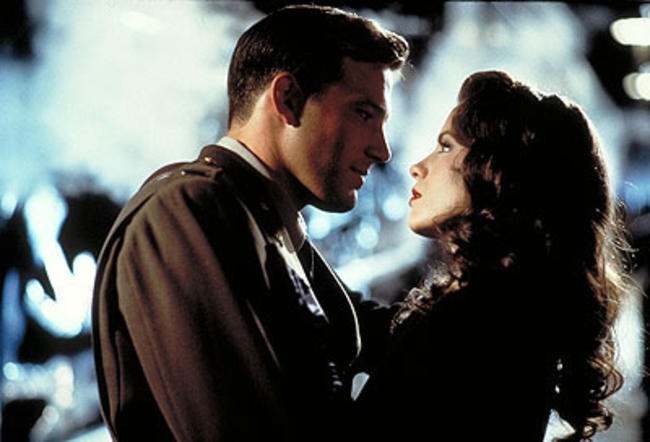
This film takes liberties with historical facts to enhance its cinematic spectacle. But what can be expected if you ask Hollywood’s pulp action blockbuster director Michael Bay to direct an historic war piece? Bay started off as a commercial and video clip director. When he made the jump to making movies, he seems to have never adjusted his cinematic language of fast cutting, constant movement, explosions, shaky cameras, flares, and heavy use of visual effects.
There is an argument to be made that he never stopped making commercials, considering his massive use of product placement. Now this seems to be working for him when doing popcorn action flicks. It gets funky when you are trying to reproduce serious historical events while trying to engage an audience with a love story.
There is a very devious thing that happens when you apply the language of a commercial to a war movie. Especially when it’s filled with so much patriotism as Bay’s films generally are, you are skating on thin ice. The American flag waves in so many slow motion shots that it’s mind boggling. But nothing beats the hospital scene when Captain Rafe McCawley (played by Ben Affleck) in a Hawaiian shirt donates blood into a Coca-Cola bottle and looks into the eyes of the beautiful nurse (played by Kate Beckinsale) while a priest is calming a dying soldier with the words: “Remember, pain is temporary, but glory is forever.”
Bay has said he makes movies for teenage boys. So what do teenage boys long for? Hot nurses, guns, airplanes, bar fights, and of course, explosions! The problem with all of this is that we are watching an actual war movie and it’s portrayed as a teenage wet dream. The girls fall in love at the drop of a hat, and the soldiers cheer ecstatically and smoke cigars to celebrate the opportunity to drop bombs on Japanese.
They desire nothing more than to put their lives on the line in glorious combat against any odds, like Affleck’s character’s answer to the question “Are all Yanks as anxious as you to get themselves killed, Pilot Officer?” “Not anxious to die, sir. Just anxious to matter.” This teenage dream ends in an orgasm of explosions on the Japanese, made by bombs from our heroic flyboys who are voluntarily on a suicide mission. The ultimate sacrifice to matter, but it’s the innocence of the popcorn blockbuster that gets shattered.
3. Act of Valor
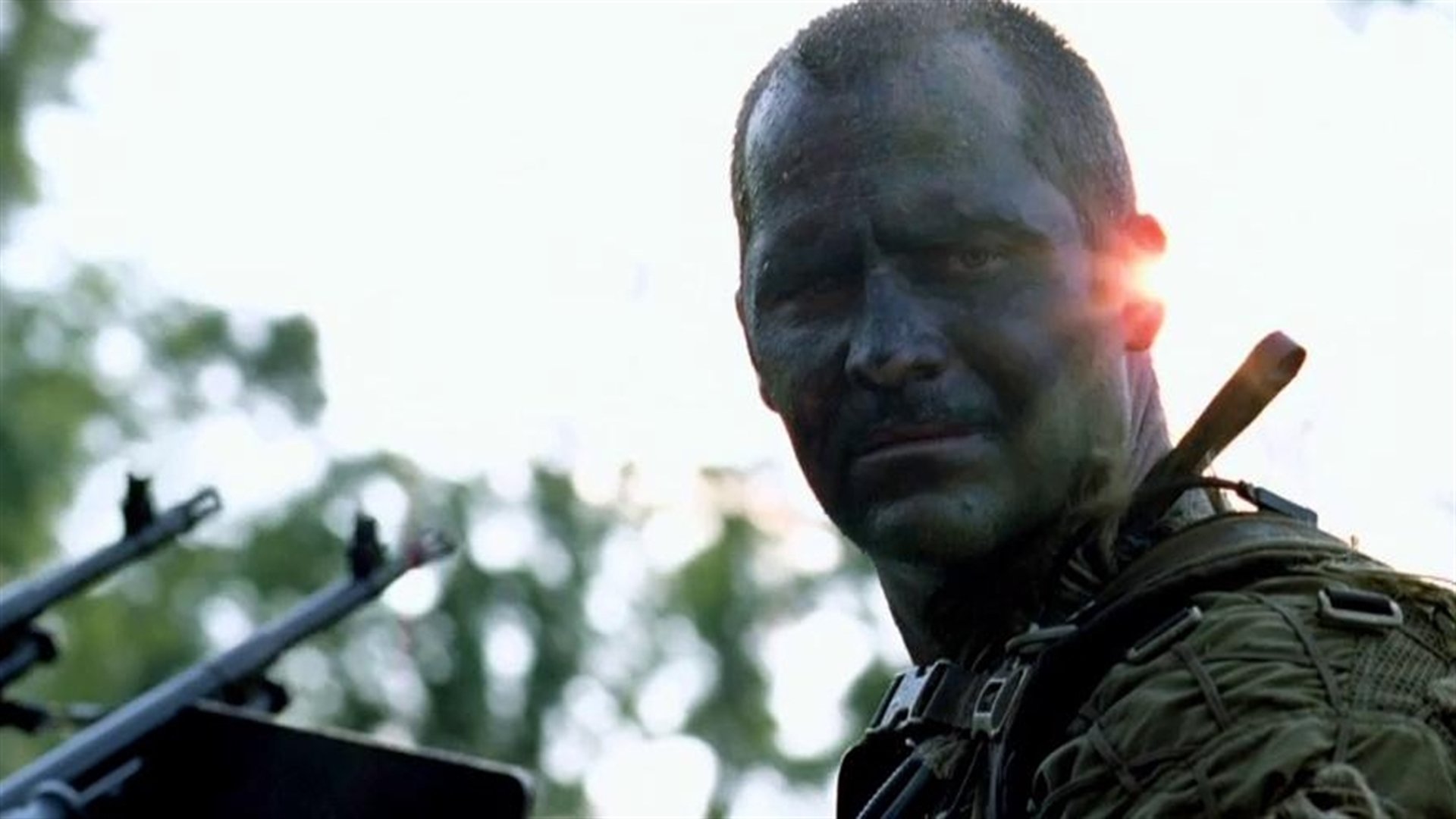
“Act of Valor” is a visceral film that tries to replicate the adrenaline rush of a Navy SEAL in combat. It goes so far to achieve this goal that it stars real Navy SEALs as protagonists. The plot is there to justify the action; when a terrorist blows up an ice cream truck to kill an US ambassador, along with his son and a group of children hungry for ice cream, all bets are off and the checklist to justify any ensuing violence has been done instantly.
Children and their innocence is a returning theme in these war movies. They are used as a sacred symbol to be protected at all costs and therefore a driving force behind war. It’s rare that they themselves become a direct target, but here they are; a gruesome act of this kind effectively allows the movie to skip any ethical debate with its audience. After the kidnapping of an CIA agent, we have a damsel in distress and the film can get to its heart: the action.
It´s not easy for an action movie in the new millennium to compete with video games like “Call of Duty”. These games put you in the shoes of a soldier and give you a first person perspective. The film was shot mostly on a Canon Eos 5d mk2 DSLR, and due to its small size and weight it allowed the filmmakers to imitate this first-person video game perspective, in effect blurring the lines between the mediums a little and perhaps fishing in the waters of the millennial gamer crowd.
The action is what we are used to from modern action films: extremely fast-matched action cutting, constantly moving shaky camera, and a heavy use of close ups. It creates a heart-pumping roller coaster ride that makes the Navy SEALs come off as such a well-oiled killing machine that it invokes both fear and admiration simultaneously.
One of the opening lines of the movie is: “Before my father died, he said the worst thing about growing old was that other men stopped seeing you as dangerous. I’ve always remembered that, how being dangerous was sacred, a badge of honor.” The film does not shy away from promoting this warrior ethos and vicariously lets you experience the thrill of modern combat, giving a taste of what might lure these gamers into looking for a more real version of their video game.
2. We Were Soldiers
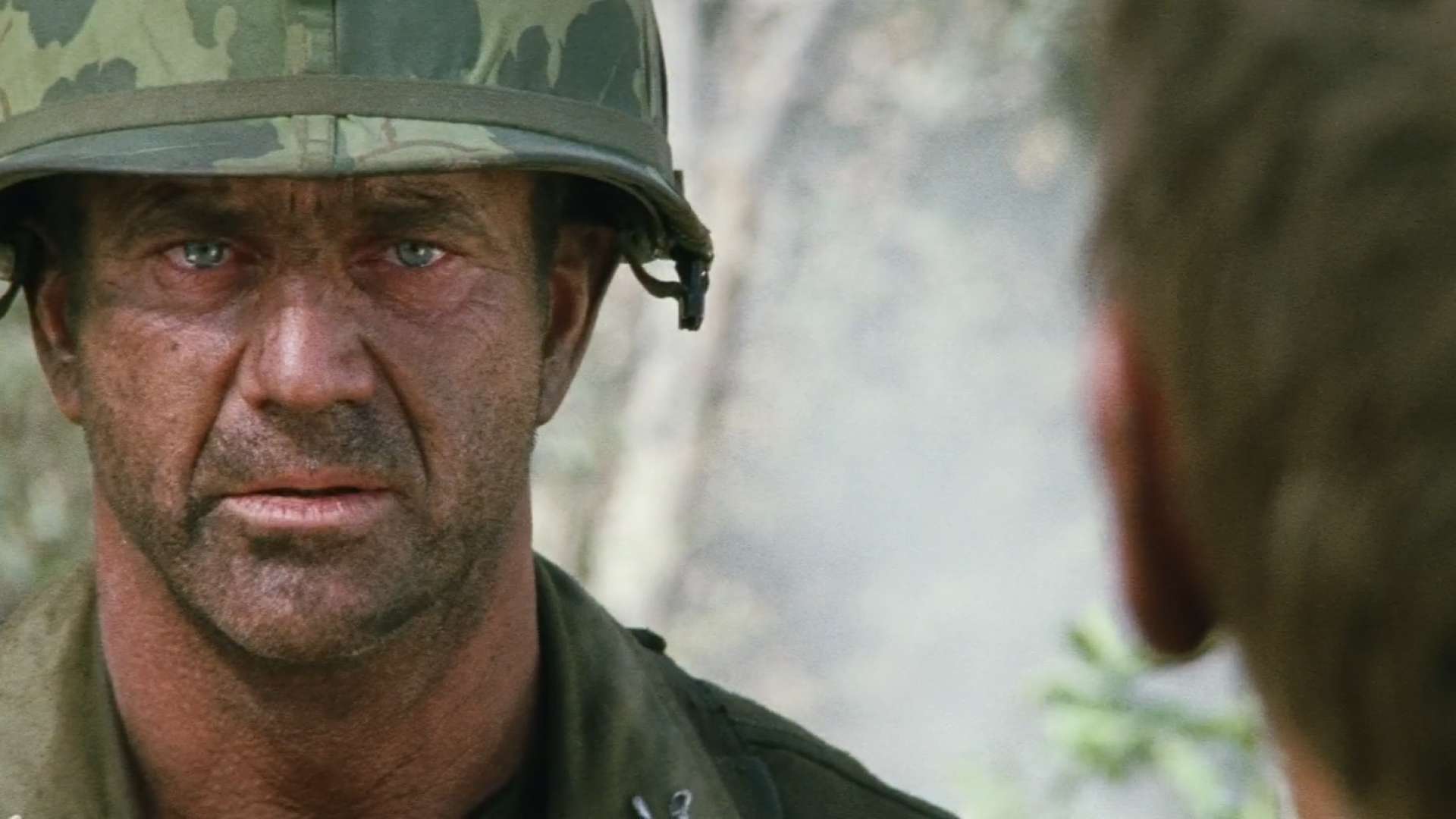
“We Were Soldiers” is a lethal cocktail of patriotism, religion, heroism, military masochism, dehumanization, and failure to address a historical context. Add to that the ever-so-powerful element of the nuclear family frightened for the life of their dear father and husband, protecting their freedom far away on the battlefield, and this cocktail will napalm every sense of criticism against America’s involvement in the Vietnam War.
The film is remarkably subversive in the sense that it does have the aura of an anti-war movie. Mel Gibson’s character is fully aware of the dangers of war and warns his soldiers in a big speech that not every man is going to come home alive. We see American soldiers being killed by the dozens and even being napalmed by friendly fire.
The wives left at home receive letters of their deceased husbands by a mere impersonal telegram delivered by a taxi driver. But it is in the juxtaposition with the relentless, mindless Vietcong army that the movie tries to make the Americans soldiers look like saints who are merely defending themselves.
The empathy it tries to invoke by showing how strong the camaraderie is between the Americans, and how they protect the never leave a man behind policy, compared to the ant-like behavior of the communist Vietcong, is quite blatant.
It makes them morally superior, and therefore our hearts must cheer for them and see them as the victims of the relentless waves of bloodthirsty Vietcong, combined with the grief and loss they experience over every soldier lost. How could one not feel sympathetic with the men laying down their lives so honorably for their country (one soldier dies with the line: “I’m glad I could die for my country.”)?
The film makes a very clear attempt at taking the soldier’s perspective and insinuating to be clean of any sociopolitical views. However, in one of the final scenes after the battle is over, it tries to discredit the media’s coverage of the war by portraying them as tabloid-like, merely showing the aftermath consisting of body piles and interviews with traumatized soldiers who fail to find words to convey the horrors they have experienced.
The message is that the only true story will be told by Joe Galloway (the writer of the book upon which the movie is loosely based), who was there shoulder to shoulder with the soldiers, who became his best friends on the battlefield. In the end, it does beg the question of how objective that perspective really is.
1. The Green Berets
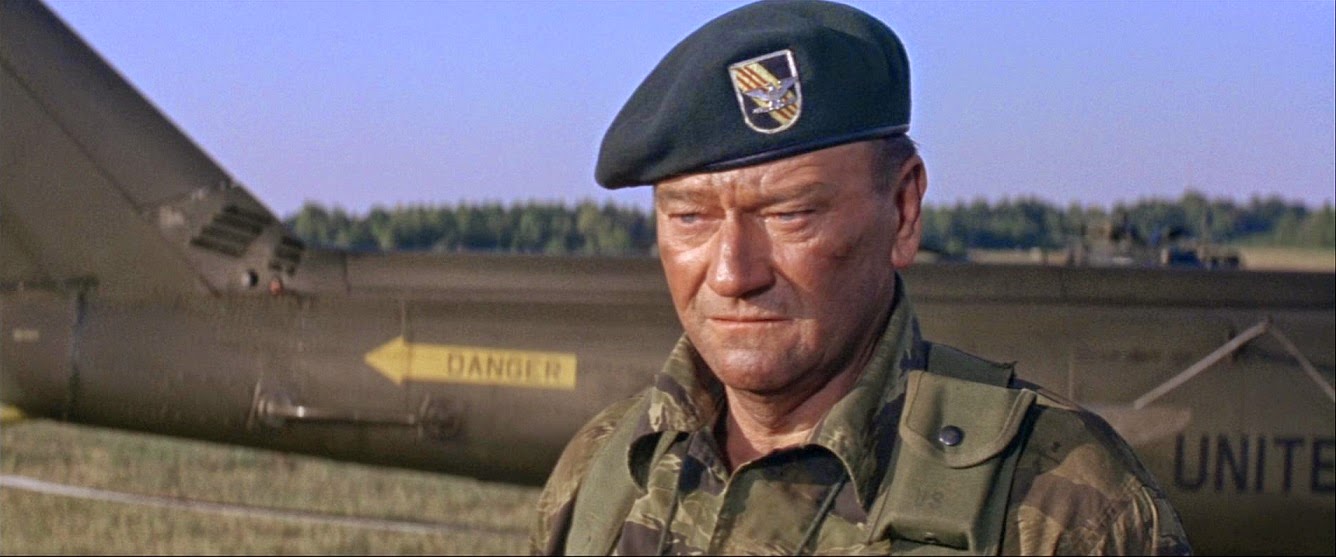
This film is John Wayne’s answer to the massive criticism the Vietnam War received. It bears some resemblance to the way the current President of the United States Donald Trump handles criticism: “Alternative facts and vilification of the press.”
The movie starts out by painting journalists as a bunch of naive pencil pushers. The soldiers gracefully give the journalists some history lessons and dodge their critical questions by pointing out that they have not seen the real face of communism, because they have not been where the soldiers have been. Suggesting that the reasons are plain as day if you walk around in the war-torn jungles of Vietnam.
Then a soldier propagates a fear-mongering speech about how every mayor, teacher, professor, governor, etc. would be tortured and killed if the same if America should befall the same fate as Vietnam. “Total communist domination of the world” is what must be prevented, he says. One of the journalists takes this criticism to heart and follows the green berets into war to see for himself.
What ensues in Vietnam is the complete moral justification of America’s presence. They give medical care to the locals, a home for orphaned children, and offer protection, money and food to the Vietnamese farmers who proclaim their gratitude for their newfound guardian angels. In contrast, the Vietcong rapes, murders, kills civilians, sets poisonous traps, and infiltrates.
It does not get more black and white than this. The at first skeptical journalist practically joins the Army after seeing the clear good and evil, and claims that if he would write what he feels he would be out of a job (again a stab at the “biased” media). In the end, patriot cowboy John Wayne walks off yet again into another sunset, hand in hand with an orphaned Vietnamese boy who he will take under his military wing.
Author Bio: Jordi Beukers is a freelance film editor driven by an urgency to reflect on the world’s condition and cinema’s role in it. You can find more about him here: https://www.jordibeukers.com/.